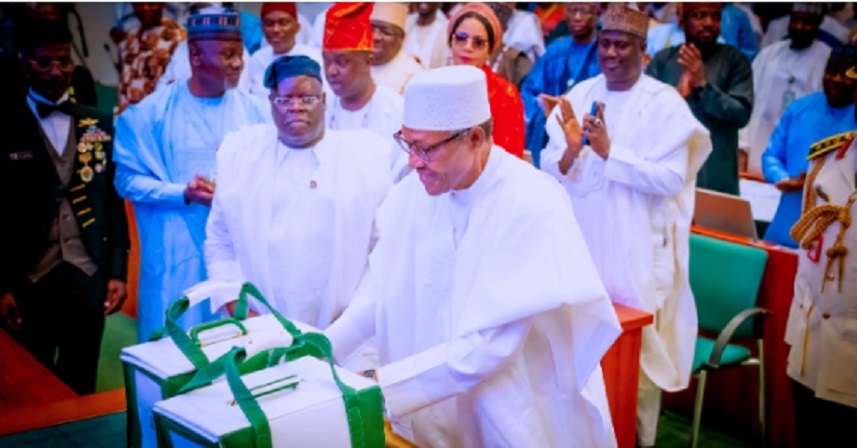Economy
N20.51trn 2023 Budget is Nigeria’s Highest in History

By Adedapo Adesanya
President Muhammadu Buhari on Friday presented before the two chambers of the National Assembly a record N20.51 trillion proposed budget for the 2023 financial year.
The N20.51 trillion budget, which is the highest so far in the nation’s history, is the last to be presented by the President before his tenure elapses on May 29, 2023.
Mr Buhari had been expected to present an Appropriation Bill of N19.75 trillion.
According to the President, this 8th financial blueprint of his administration is tagged the Budget of Fiscal Sustainability and Transition.
Mr Buhari while addressing members of the parliament noted that the 2023 transition budget was designed to address critical issues and lay a solid foundation for the incoming administration.
President Buhari said he believes that based on these fiscal assumptions and parameters, total federally-collectable revenue is estimated at N16.87 trillion in 2023.
Furthermore, he stated that the total federally distributable revenue is estimated at 11.09 trillion, while the total revenue available to fund the 2023 federal budget is estimated at N9.73 trillion.
This he said includes the revenues of 63 Government-Owned Enterprises.
The President also disclosed that oil revenue is projected at N1.92 trillion, non-oil taxes are estimated at N2.43 trillion, and FGN independent revenues are projected to be N2.21 trillion.
Other revenues total N762 billion, while the retained revenues of the GOEs amount to N2.42 trillion.
In his speech, Mr Buhari stressed that the 2023 Appropriation Bill aims to maintain the focus of MDAs on the revenue side of the budget and greater attention to internal revenue generation.
“Sustenance of revenue diversification strategy would further increase the non-oil revenue share of total revenues,” President Buhari opined.
While N2.42 trillion would be for spending by GOEs, the proposed N20.51 trillion 2023 expenditure comprises: Statutory Transfers of N744.11 billion; Non-debt Recurrent Costs of N8.27 trillion; Personnel Costs of N4.99 trillion; Pensions, Gratuities and Retirees’ Benefits of N854.8 billion; Overheads of N1.11 trillion; Capital Expenditure of N5.35 trillion, including the capital component of Statutory Transfers; Debt Service of N6.31 trillion; and Sinking Fund of N247.73 billion to retire certain maturing bonds.
He said the government expects total fiscal operations to result in a deficit of N10.78 trillion, noting that it represents 4.78 per cent of estimated GDP, above the 3 per cent threshold set by the Fiscal Responsibility Act 2007.
“As envisaged by the law, we need to exceed this threshold considering the need to continue to tackle the existential security challenges facing the country,” Mr Buhari explained.
Speaking further, the President revealed that the government plans to finance the deficit mainly by new borrowings totalling N8.80 trillion, N206.18 billion from Privatization Proceeds and N1.77 trillion drawdowns on bilateral and multilateral loans secured for specific development projects and programmes.
Economy
Dangote’s Impact Visible in Our Economy, Communities—Ogun Governor

By Aduragbemi Omiyale
The Governor of Ogun State, Mr Dapo Abiodun, has praised Dangote Industries Limited for being an “exemplary strategic partner in our collective pursuit of industrial advancement and sustainable economic development.”
Speaking at the opening ceremony of the ongoing 15th Gateway International Trade Fair in Abeokuta, the Governor described the conglomerate as a strategic partner in the industrial and economic development of the state through investments.
Mr Abiodun, represented by the Commissioner for Trade, Industry and Investments, Mr Emmanuel Adebola Sofela, disclosed that, “Dangote’s legacy in Ogun State stands as a model of how meaningful collaboration between government and the private sector can deliver transformative results.”
According to him, the Dangote Group is no longer just an investor but a trusted ally—“one whose impact is visible in our economy, our communities, and the future we are building.”
He stated that over the years, the group’s unwavering commitment to excellence, innovation, and nation-building has not only strengthened Nigeria’s industrial backbone but has also contributed immensely to the prosperity and competitiveness of Ogun State.
“Through visionary investments, job creation, and consistent support for infrastructure and community growth, the Dangote Group has demonstrated what it means to be a responsible corporate citizen and a catalyst for broad-based development.
“Their partnership with Ogun State continues to open doors of opportunity for our people, energise local industries, and reinforce our reputation as a leading destination for productive enterprise,” he further noted.
Recall that Ibese, in the Yewa axis of Ogun State, is a host to the Dangote Cement Plc’s 12 million mtpa production capacity cement plant, while another 6 million mtpa cement plant is currently under construction at Itori, also in Ogun State.
Earlier, the president of Ogun State Chamber of Commerce, Industries, Mines and Agriculture (OGUNCCIMA), Mr Niyi Oshiyemi, in the same vein, commended the management of Dangote Group for always rising to be counted among the partners of the chamber in an effort to collaborate with the private sector for meaningful economic development.
“Today is not just the commencement of another trade fair but the celebration of collaborations, innovations, and shared prosperity.
“The trade fair in the last 15 years has served as a vital platform where ideas meet opportunity, where businesses connect with the market and where partnerships are formed to drive sustainable economic growth,” he said.
According to him, in an era defined by rapid technological advancement, global competitiveness and ever-evolving consumer needs, no business can thrive in isolation. The future belongs to those who build strong partnerships.
Mr Oshiyemi noted that OGUNCCIMA has been able to strengthen Ogun State’s position as a leading commercial and industrial hub in Nigeria and West Africa because it has been able to encourage investments, trade linkages and technology transfer by supporting policies and initiatives that enhance the ease of doing business in the state.
Economy
Presidential Directives Boost Efforts to Unlock Owowo Deepwater Resources—Baxi

By Adedapo Adesanya
The Managing Director and Lead Country Manager of ExxonMobil’s affiliates in Nigeria, Mr Jagir Baxi, has noted that recent presidential directives have been instrumental in strengthening the company’s efforts to unlock deepwater resources.
Mr Baxi was appointed to the position in July 2025 to oversee ExxonMobil’s business in Nigeria, including Esso Exploration and Production Nigeria Limited and Esso Exploration and Production Nigeria (Offshore East) Limited.
In an interview with The Energy Year, he said the directives issued by President Bola Tinubu in May 2025 were specifically designed to eliminate rent-seeking, slash project timelines, reduce contracting costs, and restore investor confidence in the Nigerian upstream sector.
According to him, Esso Nigeria is now focusing on advancing deepwater oil and gas developments as part of ExxonMobil’s portfolio after its divestment from the joint venture with Nigerian National Petroleum Company (NNPC) Limited.
“The presidential directives have been instrumental in strengthening Nigeria’s competitiveness in the oil and gas sector. For Esso Nigeria and our shareholder, ExxonMobil, they’ve provided a meaningful platform to reassess our discovered but undeveloped resources – most notably Owowo.
“These directives signal a commitment from the highest levels of government to address long‑standing barriers to deepwater investment, and that’s an important catalyst for industry confidence,” he said.
The ExxonMobil executive noted that the directives have enabled the oil major to take tangible steps forward while working closely with the state oil company and other agencies in the sector.
“We are co‑developing a contracting strategy tailored specifically to the scale and complexity of a world‑class deepwater project,” he noted, adding, “In parallel, we’ve collaborated with the Nigerian Content Development and Monitoring Board to shape a project‑specific National Content Strategy – one designed to both enable the project and deliver sustained, impactful benefits to Nigerian businesses and the workforce. That alignment is critical if we want to create value that extends far beyond the life of a single development.”
“That said, one essential element is still outstanding: codified implementation guidance. For investors, particularly those making multi‑billion‑dollar commitments over 20 to 30‑year horizons, clarity and predictability are non‑negotiable. Our concern stems from recent experience – instances where progress delivered through certain government actions was later eroded by others. It underscores why stability in fiscal and regulatory frameworks is so vital.
“If Nigeria can translate these directives into consistent, durable rules of engagement, the country will be positioned to unlock deepwater investment at a scale that delivers long‑term value for the nation, its citizens, and its partners. And we believe that is absolutely achievable,” he explained.
Economy
CAC Pushes for Harmonised National Register to Strengthen Anti-Crime Fight

By Adedapo Adesanya
The Corporate Affairs Commission (CAC) has called for the establishment of a single, harmonised national register for beneficial ownership to strengthen Nigeria’s anti-corruption framework and improve the fight against corporate and financial crimes.
The Registrar-General of CAC, Mr Hussaini Magaji, made the call during the commission’s 35th anniversary celebration, designated as Anti-Corruption Day on Tuesday in Abuja.
Mr Magaji said the current fragmented system of beneficial ownership disclosure, where some sectors maintained separate registers outside the CAC framework, created duplication, inconsistencies and regulatory loopholes that could be exploited for illicit activities.
According to him, CAC is legally and institutionally positioned to serve as the central repository for beneficial ownership information in Nigeria.
He said that access to accurate corporate records was critical to the successful investigation and prosecution of financial crimes.
He said that the CAC remained the custodian of information on company ownership, control and management.
“No successful prosecution of corporate and financial crimes can be achieved without the support of the Corporate Affairs Commission,” Mr Magaji said.
He reaffirmed the commission’s commitment to sustained collaboration with anti-corruption and law enforcement agencies.
“These include the Economic and Financial Crimes Commission (EFCC), Independent Corrupt Practices and Other Related Offences Commission (ICPC), Nigerian Financial Intelligence Unit (NFIU) and the National Drug Law Enforcement Agency (NDLEA),” he said.
Mr Magaji called for deeper information sharing, joint investigations and real-time verification processes to enhance enforcement outcomes.
The CAC boss also urged stakeholders to support the passage of the Persons with Significant Control (PSC) Rules into an Act of the National Assembly, saying a stronger legal framework was required to address sophisticated abuses of corporate structures.
He disclosed that companies that failed to disclose their beneficial owners were flagged as inactive in CAC records, adding that such entities should not enjoy the privileges of legality.
Mr Magaji, however, expressed concern that some financial institutions continued to transact with non-compliant companies, describing the practice as a major weakness in the national compliance chain.
On internal reforms, he said, CAC had demonstrated zero tolerance for corruption by surrendering three staff members to the ICPC over alleged misconduct and submitting details of 248 fake company registrations to the EFCC for investigation.
According to him, the fight against corruption requires coordinated efforts across institutions and sustained commitment to transparency and accountability.
-

 Feature/OPED6 years ago
Feature/OPED6 years agoDavos was Different this year
-
Travel/Tourism10 years ago
Lagos Seals Western Lodge Hotel In Ikorodu
-

 Showbiz3 years ago
Showbiz3 years agoEstranged Lover Releases Videos of Empress Njamah Bathing
-

 Banking8 years ago
Banking8 years agoSort Codes of GTBank Branches in Nigeria
-

 Economy3 years ago
Economy3 years agoSubsidy Removal: CNG at N130 Per Litre Cheaper Than Petrol—IPMAN
-

 Banking3 years ago
Banking3 years agoSort Codes of UBA Branches in Nigeria
-

 Banking3 years ago
Banking3 years agoFirst Bank Announces Planned Downtime
-

 Sports3 years ago
Sports3 years agoHighest Paid Nigerian Footballer – How Much Do Nigerian Footballers Earn












